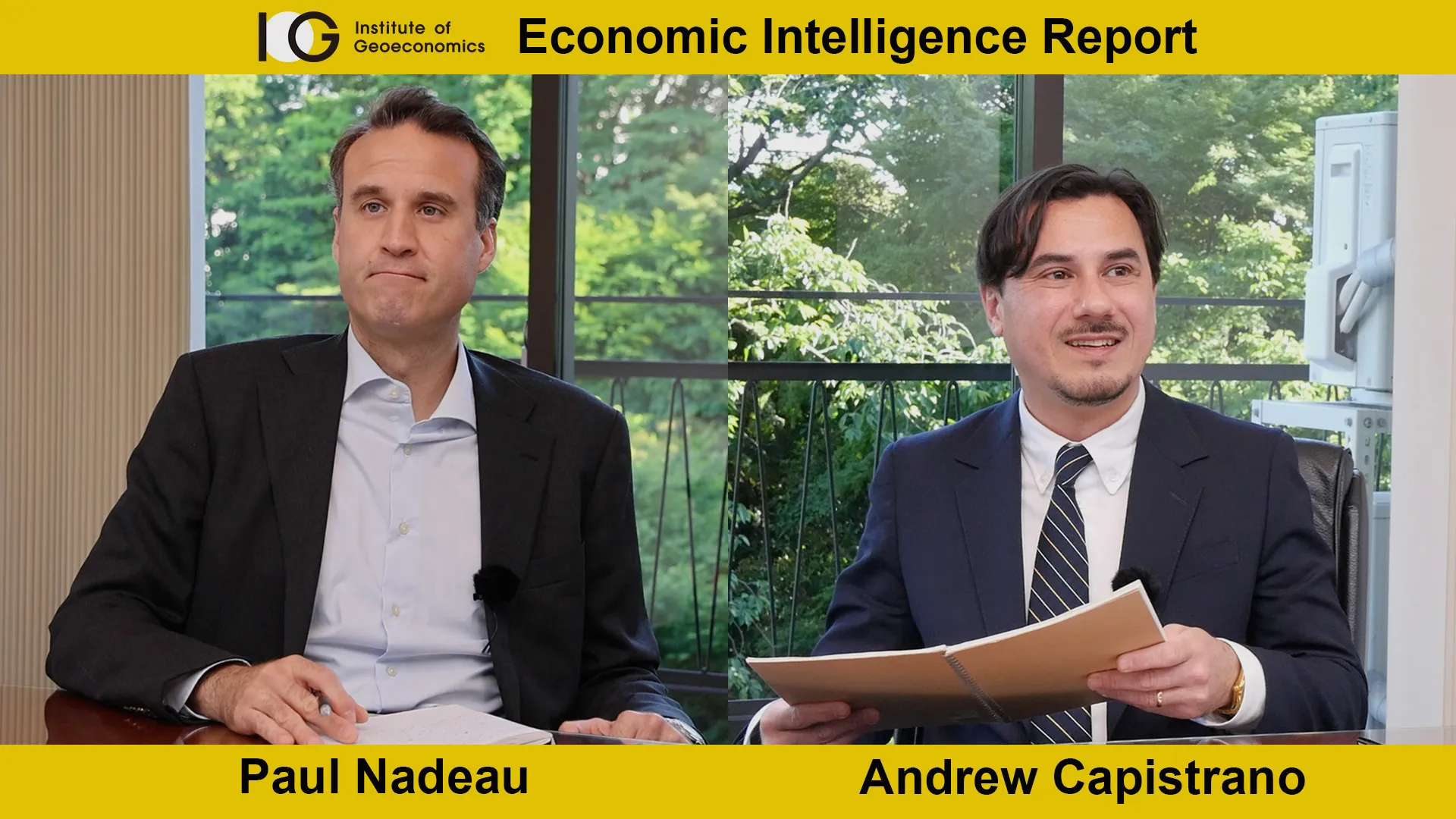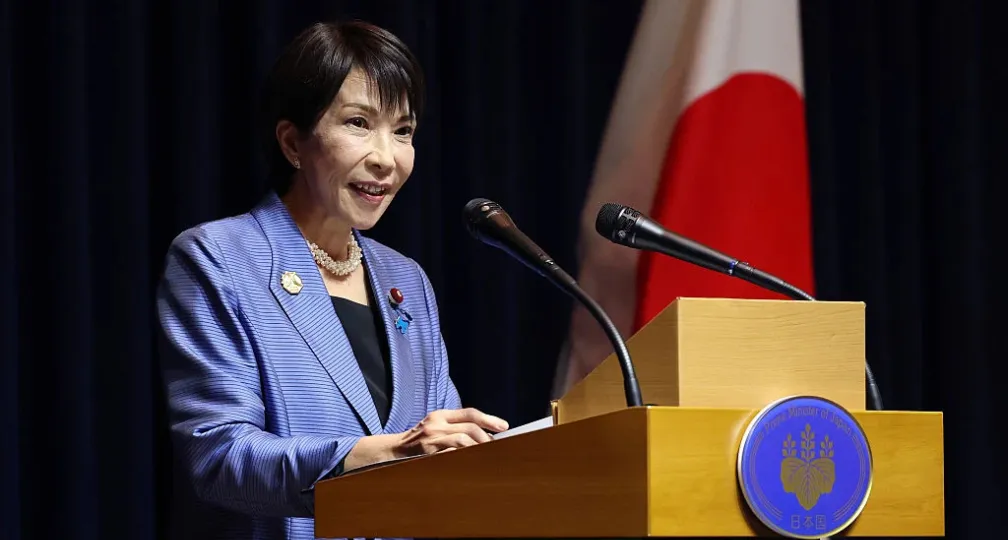IOG Economic Intelligence Report (Vol. 2 No. 8)

The latest regulatory developments on economic security & geoeconomics
The New Washington Consensus: U.S. National Security Advisor Jake Sullivan delivered an address on U.S. international economic strategy at the Brookings Institution in Washington, DC on April 27. In his speech, he expressed skepticism about further liberalization, particularly in terms of reducing tariffs, and towards international economic integration. In response, he offered a defense of the Inflation Reduction Act and of industrial policy in general, while also emphasizing cooperation with U.S. partners. His speech is discussed in further detail in the analysis below.
Ambassador Tai Visits Japan:U.S. Trade Representative Katherine Tai met with Nishimura Yasutoshi, minister of Japan’s Ministry of Economy, Trade, and Industry in Tokyo on April 19. At their meeting, they signed the U.S.-Japan Critical Minerals Agreement, a moratorium stating that electric vehicles manufactured in the United States but using materials sourced from Japan will be eligible for tax breaks under the Inflation Reduction Act (IRA). Automakers from Japan, as well as from the EU, have been concerned that the IRA rules to qualify for tax breaks unfairly advantage U.S. auto manufacturers.
They also discussed the Indo-Pacific Economic Framework (IPEF) in preparation for the upcoming negotiating round in Singapore in May, the upcoming APEC trade ministerial in Detroit this May, the G7 trade ministerial in Osaka this October, and Japan-U.S. cooperation on business and human rights following the Memorandum of Cooperation on the Japan-U.S. Task Force on the Promotion of Human Rights and International Labor Standards in Supply Chains that was signed in January 2023.
Ambassador Tai also appeared at the Foreign Correspondent’s Club of Japan during her visit in Tokyo. During her appearance, she insisted that the United States is not seeking to decouple from China and that any trade sanctions towards the country are “narrowly targeted”.
Back on the Fast-Track: Japan’s METI announced that it has begun procedures to restore preferential status for South Korea , restoring South Korea to a list of 26 other countries that receive similar status. The move comes after METI was satisfied that South Korea’s controls over trade in sensitive materials matches that of Japan’s and after South Korea restored Japan to its own preferential trading list.
Agreeing to Discuss: U.S. Commerce Secretary Gina Raimondo and South Korea’s Industry Minister Chang-Yang Lee announced that their two countries would “continue discussions on the requirements and opportunities of the CHIPS Act” in order to “minimize uncertainties of corporate investments and business burdens”. South Korean firms have expressed concern about some of the transparency requirements in the IRA, particularly over confidential business information, and over the upcoming expiration of the one-year grace period of controls which will expire in October.
Expanding the Entity List: The U.S. Commerce Department added 28 firms to its “entity list” of sanctioned companies on April 12 for attempting to evade export controls or assist Russia’s military or industrial base. The firms, which include companies from China, Turkey, Russia Singapore, Armenia, Uzbekistan, Spain, Syria, and the United Arab Emirates, have been sanctioned for violations including assisting in the transfer of material or personnel from Iran to Russia, coordinating flights, or attempting to acquire U.S.-origin items on behalf of companies already on the “red flag” list. The announcement is part of a “third country crackdown” on transhipment of items to Russia.
Firms on the entity list must receive U.S. government authorization in order to obtain certain U.S. technologies, which effectively bars suppliers from shipping U.S. technology to these companies. The U.S. Commerce Department has added roughly 400 companies to the entity list since Russia’s invasion of Ukraine began in February 2022.
Big Commitments: The Financial Times found that there have been $200 billion in commitments to U.S. manufacturing following last summer’s passage of the IRA and CHIPS Act. While not all commitments are the result of the legislation, the amount “is almost double the capital spending commitments made in the same sectors in 2021 and nearly 20 times the amount in 2019” could create as many as 82,000 jobs, primarily in semiconductors, electric vehicles, and batteries.
Pushing Back against Industry: A group of progressive Democrats sent a letter to Ambassador Tai and to Commerce Secretary Gina Raimondo to ask to reject efforts by the tech industry to shape rules on data sharing, privacy, and antitrust. The authors also criticized the Biden administration’s anticipated deadline for the talks, insisting that Congress must be consulted to fulfill the administration’s “commitments to promote competition in the economy, to protect digital privacy, and to advance a worker-centered trade policy”. In March, Ambassador Tai told Congress that the administration was limited in how far it can advance rules in this space because Congress insists that U.S. rules in negotiations must be consistent with congressional language and Congress has failed to enact its own legislation.
Analysis: The New Washington Consensus
On April 27, U.S. National Security Advisor Jake Sullivan set out U.S. economic strategy in a major speech delivered at the Brookings Institution in Washington, DC. The speech didn’t feature much new and while it could be notable for its emphatic statement of purpose, it remains a strategy defined more by what it doesn’t want to do than by what it’s aiming to achieve. Sullivan has named the right problems facing the U.S. and global economies: the legacy of trickle-down economics, the privileging of finance, the scale and challenge of China’s nonmarket economy, economic coercion, climate change, and so on. He’s also not wrong that these issues have endangered democratic stability in the sense that the economic dislocation that resulted from these processes made populist political appeals more salient (even though that’s an extremely incomplete argument).
Yet the solutions suggested don’t offer a systemic response to the challenges it’s identified. There are certain solutions that are welcome, like economic security, supply chain resiliency, and a focus on climate change, to name a few. But the ambitions that he and others connected to the administration have named – rebuilding the middle class, building political support for decarbonization, out-competing China, and rebuilding faith in democracy – don’t represent an international economic program. In effect, it’s not meant to solve international challenges, it’s using the international economy to solve domestic policy problems.
That will make program described a difficult sell internationally. Publicly and privately, the administration insists that their strategy is cooperative and multilateral and will refer to the various consultations that have taken place over time and across forums. Their negotiating counterparts in East Asia are certainly willing to go along with the program often come away with the impression that it all seems half-hearted and questionably executed. For multilateralism to work, partners need incentives to offer concessions and, maybe more importantly, they need to share a common vision of the challenge presented by China. Both are lacking. Gaining leverage to achieve concessions on labor and environmental commitments will be harder without the incentive of market access provided by “traditional” free trade agreements.
U.S. officials might insist that they’re not trying to decouple from China or stop China’s growth, and they may genuine and even correct, but that’s a tougher sell in East Asia than they often seem to assume. U.S. partners in Asia are alarmed by China’s behavior and certainly welcome steps to improve economic security. But they’re not always alarmed by the same things or to the same extent – as indicated in Prime Minister Kishida Fumio’s recent interview in The Economist, it’s almost as important to control the temperature as it is to confront Chinese practices. Until that point is internalized by U.S. decision makers, any U.S. attempt to confront China will be met with gritted teeth in East Asia (to be fair, the same goes for China who continues to take aggressive steps like detaining Japanese professionals).
Ultimately, Sullivan’s speech doesn’t read as a vision so much as a post-hoc rationalization of the situation that the United States found itself in by not being more proactive earlier. It’s worth asking which trade deals he’s talking about when he says that there should be no more trade for trade’s sake, because that’s certainly not how U.S. counterparts in East Asia are see trade agreements. When Sullivan says that the WTO needs reform, he doesn’t explain how the U.S. failure to appoint judges to the appellate body or its rejection of the WTO ruling on steel tariffs advances that cause. Left unsaid in his speech was how the “China shock” was made worse because paltry U.S. worker readjustment programs. Those aren’t issues of international economics but domestic policy responses.
The good news and bad news of the speech is that it serves more as an abstract vision of U.S. international economic engagement than a concrete program. Good news, because the speech doesn’t mark a radical departure from what’s already on the agenda; bad news, because it removed any lingering doubt about that the United States is going to be a much more complicated partner to deal with on questions of international economics.
Disclaimer: The views expressed in this IOG Economic Intelligence Report do not necessarily reflect those of the API, the Institute of Geoeconomics (IOG) or any other organizations to which the author belongs.
API/IOG English Newsletter
Edited by Paul Nadeau, the newsletter will monthly keep up to date on geoeconomic agenda, IOG Intelligencce report, geoeconomics briefings, IOG geoeconomic insights, new publications, events, research activities, media coverage, and more.


Visiting Research Fellow
Paul Nadeau is an adjunct assistant professor at Temple University's Japan campus, co-founder & editor of Tokyo Review, and an adjunct fellow with the Scholl Chair in International Business at the Center for Strategic and International Studies (CSIS). He was previously a private secretary with the Japanese Diet and as a member of the foreign affairs and trade staff of Senator Olympia Snowe. He holds a B.A. from the George Washington University, an M.A. in law and diplomacy from the Fletcher School at Tufts University, and a PhD from the University of Tokyo's Graduate School of Public Policy. His research focuses on the intersection of domestic and international politics, with specific focuses on political partisanship and international trade policy. His commentary has appeared on BBC News, New York Times, Nikkei Asian Review, Japan Times, and more.
View Profile-
 Japan’s Sea Lanes and U.S. LNG: Towards Diversification and Stabilization of the Maritime Transportation Routes2026.02.24
Japan’s Sea Lanes and U.S. LNG: Towards Diversification and Stabilization of the Maritime Transportation Routes2026.02.24 -
 Fed-Treasury Coordination as Economic Security Policy2026.02.13
Fed-Treasury Coordination as Economic Security Policy2026.02.13 -
 What Takaichi’s Snap Election Landslide Means for Japan’s Defense and Fiscal Policy2026.02.13
What Takaichi’s Snap Election Landslide Means for Japan’s Defense and Fiscal Policy2026.02.13 -
 Challenges for Japan During the U.S.-China ‘Truce’2026.02.12
Challenges for Japan During the U.S.-China ‘Truce’2026.02.12 -
 India and EU Sign Mother of All Deals2026.02.09
India and EU Sign Mother of All Deals2026.02.09
 Orbán in the Public Eye: Anti-Ukraine Argument for Delegitimising Brussels2026.02.04
Orbán in the Public Eye: Anti-Ukraine Argument for Delegitimising Brussels2026.02.04 Fed-Treasury Coordination as Economic Security Policy2026.02.13
Fed-Treasury Coordination as Economic Security Policy2026.02.13 When Is a Tariff Threat Not a Tariff Threat?2026.01.29
When Is a Tariff Threat Not a Tariff Threat?2026.01.29 Oil, Debt, and Dollars: The Geoeconomics of Venezuela2026.01.07
Oil, Debt, and Dollars: The Geoeconomics of Venezuela2026.01.07 India and EU Sign Mother of All Deals2026.02.09
India and EU Sign Mother of All Deals2026.02.09














